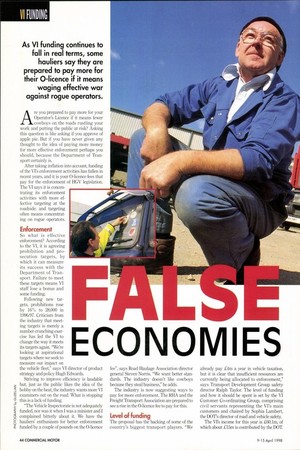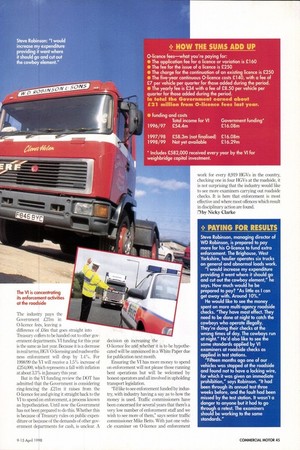ECONOMIES As VI funding continues to fall in real terms,
Page 46

Page 47

If you've noticed an error in this article please click here to report it so we can fix it.
some hauliers say they are prepared to pay more for their 0-licence if it means waging effective war against rogue operators.
Are you prepared to pay more for your Operator's Licence if it means fewer cowboys on the roads rustling your work and putting the public at risk? Asking this question is like asking if you approve of apple pie. But if you have never given any thought to the idea of paying more money for more effective enforcement perhaps you should, because the Department of Transport certainly is.
After taking inflation into account, funding of the VI's enforcement activities has fallen in recent years, and it is your 0-licence fees that pay for the enforcement of HGV legislation. The VI says it is concen trating its enforcement activities with more effective targeting at the roadside: and targeting often means concentrating on rogue operators.
Enforcement So what is effective enforcement? According to the VI, it is agreeing prohibition and prosecution targets, by which it can measure its success with the Department of Transport. Failure to meet these targets means VI staff lose a bonus and some funding.
Following new targets, prohibitions rose by 16% to 28,000 in 1996/97. Criticism from the industry that meeting targets is merely a number crunching exercise has led the Vito change the way it meets its targets again. "We're looking at aspirational targets where we seek to measure our impact on the vehicle fleet," says VI director of product strategy and policy Hugh Edwards.
Striving to improve efficiency is laudable z but, just as the public likes the idea of the 14, bobby on the beat, the industry wants more VI N examiners out on the road. What is stopping this is a lack of funding.
t' "The Vehicle Inspectorate is not adequately 1funded, nor was it when I was a minister and I o complained bitterly about it. We have the hauliers' enthusiasm for better enforcement 2 funded by a couple of pounds on the 0-licence fee", says Road Haulage Association director general Steven Norris. "We want better standards. The industry doesn't like cowboys because they steal business," he adds.
The industry is now suggesting ways to pay for more enforcement. The RHA and the Freight Transport Association are prepared to see a rise in the 0-licence fee to pay for this.
Level of funding The proposal has the backing of some of the country's biggest transport players. "We already pay £4m a year in vehicle taxation, but it is clear that insufficient resources are currently being allocated to enforcement," says Transport Development Group safety director Ralph Taylor. The level of funding and how it should be spent is set by the VI Customer Co-ordinating Group, comprising civil servants representing the VI's main customers and chaired by Sophia Lambert, the DOT's director of road and vehicle safety The VI's income for this year is £60.1m, of which about 115m is contributed by the DOT. The industry pays the Governmen £21m in 0-licence fe , leaving a difference o £6m that goes straight into Treasury coffers to be handed out to other government deçlartments. VI funding for this year is the same as last year. Because it is a decrease in real terms, HGV 0-licensing and roadworthiness enforcement will drop by 1.4%. For 1998/99 the VI will receive a 1.5% increase of £254,000, wliich represents a fall with inflation at about 3.3 °0 in January this year.
But in th VI funding review the DOT has admitted th t the Government is considering ring-fencingthe £21m it raises from the 0-licence fee and giving it straight back to the Vito spend on enforcement, a process known as hypothe tion. Until now the Government has not beer prepared to do this. Whether this is because o Treasury rules on public expenditure or beause of the demands of other government departments for cash, is unclear. A decision on increasing the 0-licence fee and whether it is to be hypothecated will be announced in a White Paper due for publication next month.
Ensuring the VI has more money to spend on enforcement will not please those running bent operations but will be welcomed by honest operators and all involved in upholding transport legislation.
"I'd like to see enforcement funded by industry, with industry having a say as to how the money is used. Traffic commissioners have been concerned for several years that there's a very low number of enforcement staff and we wish to see more of them," says senior traffic commissioner Mike Betts. With just one vehicle examiner on 0-licence and enforcement work for every 8,919 HGVs in the country, checking one in four HGVs at the roadside, it is not surprising that the industry would like to see more examiners carrying out roadside checks. It is here that enforcement is most effective and where most offences which result in disciplinary action are found.
Cl by Nicky Clarke + PAYING FOR RESULTS Steve Robinson, managing director of WD Robinson, is prepared to pay more for his 0-licence to fund extra enforcement. The Brighouse, West Yorkshire, haulier operates six trucks on general and abnormal loads work.
"I would increase my expenditure providing it went where it should go and cut out the cowboy element," he says. How much would he be prepared to pay? "As little as I can get away with. Around 10%."
He would like to see the money spent on more multi-agency roadside checks. "They have most effect. They need to be done at night to catch the cowboys who operate illegally. They're doing their checks at the wrong times of day. The cowboys run at night." He'd also like to see the same standards applied by VI examiners at roadside checks as applied in test stations.
"Fifteen months ago one of our vehicles was stopped at the roadside and found not to have a locking wire, for which it was given an immediate prohibition," says Robinson. "It had been through its annual test three weeks before, and the fault had been missed by the test station. It wasn't a danger to anyone but it had to go through a retest. The examiners should be working to the same standards."










































































































